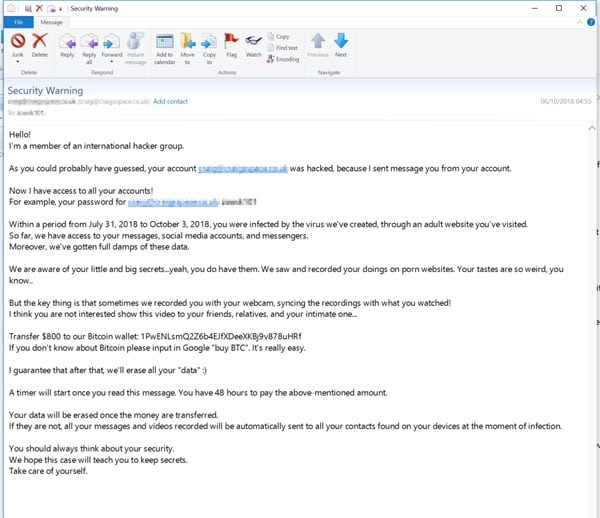What is the “I Hacked Your Device” Sextortion Email Scam?
Imagine getting an email from someone you don’t know, demanding money from you. And if you don’t hand them over your hard earned cash, they’ll release secret webcam footage of you watching ‘adult’ websites.
If you’ve ever received such an email, you’ve probably encountered one of the most popular email scams around right now. The “I’ved hacked your device” sextortion email scam.
It’s a scam that is netting crooks hundreds of thousands of dollars. And it all starts with a simple email from someone identifying themselves as a hacker. A hacker who has managed to install malware onto the recipient’s device, and using that malware has subsequently managed to obtain compromising webcam footage of the recipient visiting adult websites.
Pay up, claims the sender. Or have the footage released to every single friend, family member and even work colleague in your address book.

For the uninitiated, it’s an alarming prospect. But rest assured, it’s almost certainly a bluff. Regardless of whether you do indulge in the past time purported in the email, there is no compromising footage.
Sponsored Content. Continued below...
That’s because these scams are usually send out en masse, to thousands, if not millions of recipients. The exact same template will be pumped out to countless inboxes, in the hope that at least some recipients won’t realise it’s all just a ruse, and will pay up.
It’s a type of sextortion scam.
Sextortion is a crime whereby criminals either coerce victim’s into releasing sexually themed material of themselves, or – in this case – use the threat of releasing sexually themed material of a victim. With these scams that material doesn’t really exist, yet the threat of it is still very real and can result in victims being extorted into handing crooks money.
And if recipients do pay up, they are likely to be targeted for even more money.
Sponsored Content. Continued below...
These types of emails may include old or current passwords
To try and make their email scams appear more convincing, crooks may include passwords – old or current – in the email, offered as “proof” that they’re telling the truth.
However, if such an email does include a password, it is unlikely that it has been discovered as a result of some type of covert video-capturing malware installed on your device. Typically, the crooks have obtained that information from a past data breach from a company where you had an account, and that resulted in data being leaked onto the Internet.
Sponsored Content. Continued below...
The sextortion scammers simply take that leaked data and claim they discovered it because they installed malware on your device, when that is not really the case. Since the data breach that resulted in the password being leaked may be from many years ago, such scams will typically proffer an old, disused password as “proof”.
These scams are simply trying to extort money from victims. If you receive such a scam, the best course of action is to simply delete it.
Keep up-to-date with all the latest cybersecurity threats and our tips to stay safe online. Follow us on Facebook, Instagram and Twitter.
Continued below...
Thanks for reading! But before you go… as part of our latest series of articles on how to earn a little extra cash using the Internet (without getting scammed) we have been looking into how you can earn gift vouchers (like Amazon vouchers) using reward-per-action websites such as SwagBucks. If you are interested we even have our own sign-up code to get you started. Want to learn more? We discuss it here. (Or you can just sign-up here and use code Nonsense70SB when registering.)
Become a Facebook Supporter. For 0.99p (~$1.30) a month you can become a Facebook fan, meaning you get an optional Supporter Badge when you comment on our Facebook posts, as well as discounts on our merchandise. You can subscribe here (cancel anytime.)

